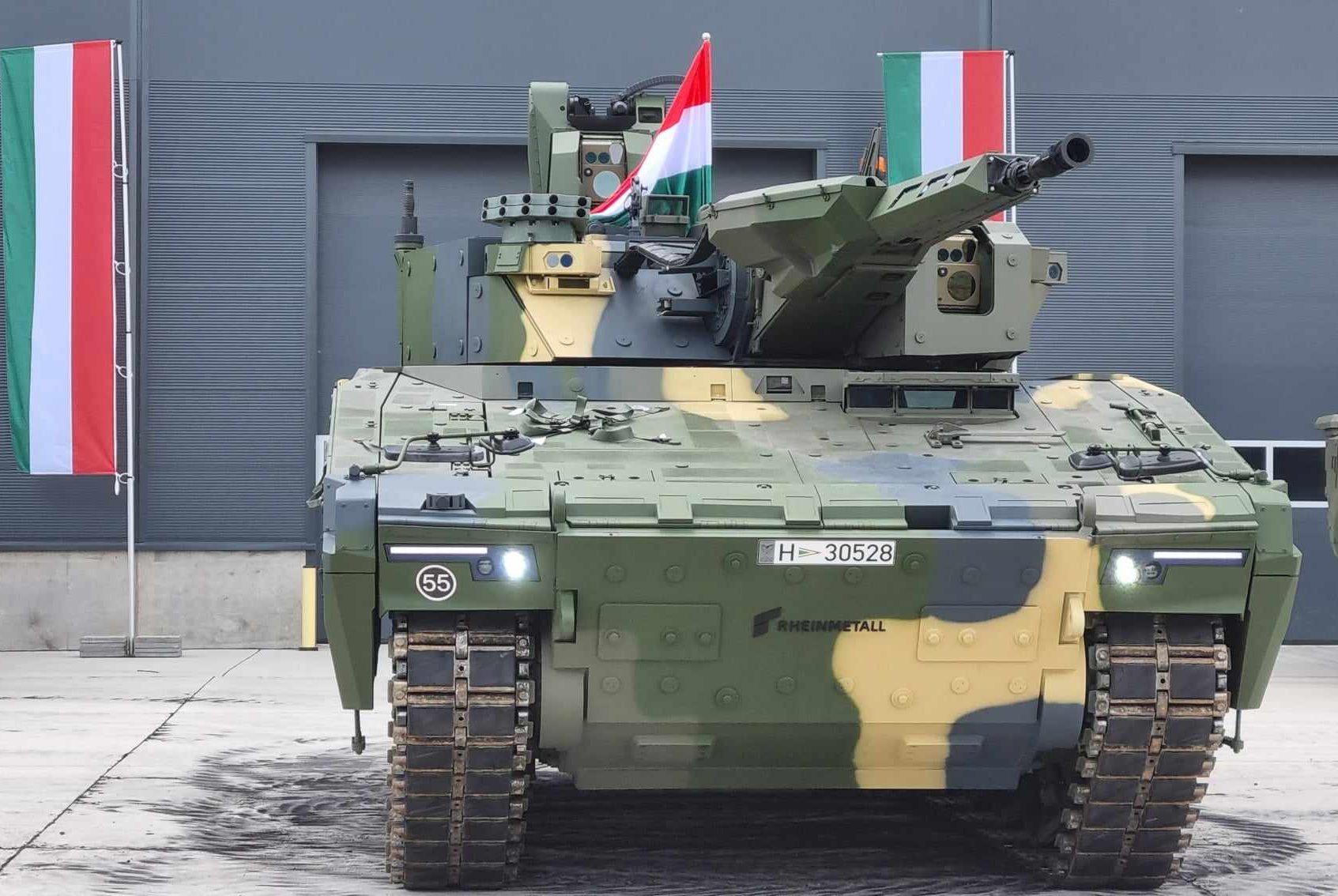
The team in Zalaegerszeg have proudly unveiled their first domestic-made vehicles. Continue reading
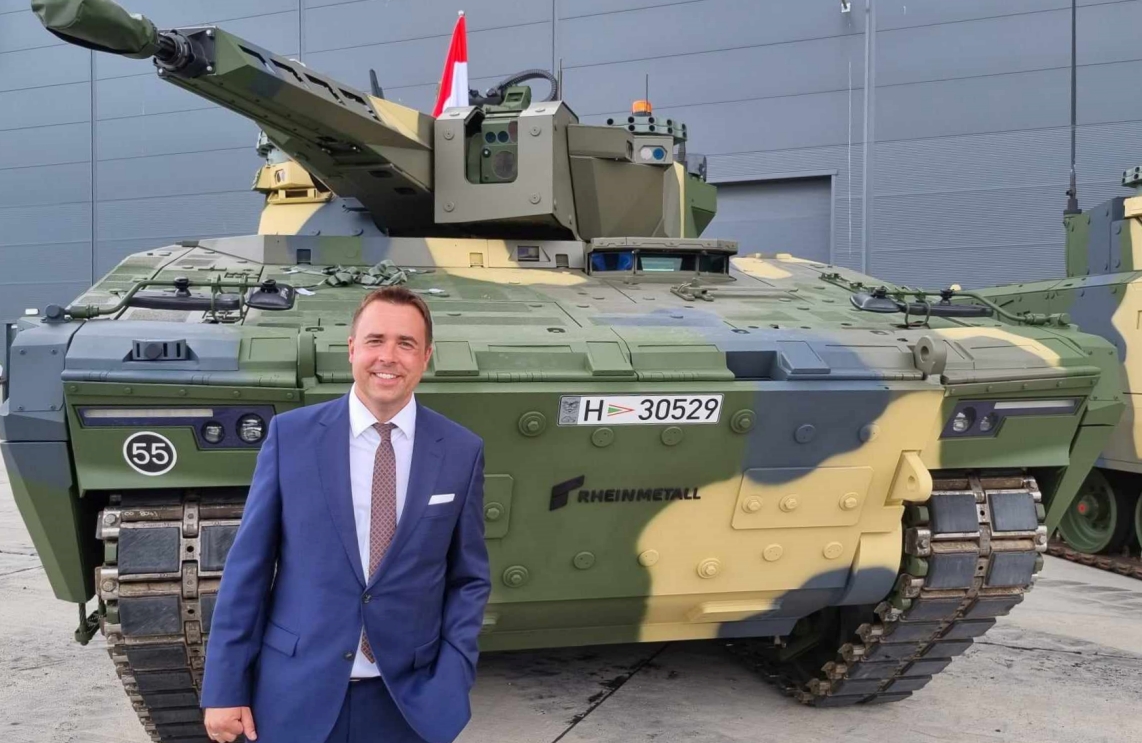
The Hungary Today team had recently visited Rheinmetall’s new manufacturing facility near Zalaegerszeg, Western Hungary, to celebrate the unveiling of the first locally manufactured Lynx KF41 infantry fighting vehicles (IFV). We were welcomed by Mr. Paul Walf, CEO of Rheinmetall Hungary Zrt., who has kindly agreed to answer our questions regarding the company’s present experience in Hungary, as well as his plans for the future.
Today, Rheinmetall had presented the first IFV produced in Hungary for our armed forces. What is the planned schedule for the rest of the Hungarian order, at what weekly pace are you able to deliver the next pieces?
I am proud to say that we completed the second vehicle shortly after the first and will hand in over to the Hungarian Defense Forces (HDF) in the coming days already.
Going forward we will continue to ramp up production throughout the next year to reach our scheduled target output, but I can not disclose the number due to security reasons. It is however important to note that the capacity of our Zalaegerszeg facility is greater than what is currently contracted for. With additional staff we could produce up to 100 Lynx IFVs a year in a few years. You have to understand that we do not simply assemble the Lynx for the HDF here in Zalaegerszeg. The scope of production is actually quite large. If we were to focus on assembly only, the output would potentially be twice as much.
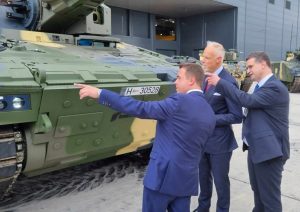
(L-R) Paul Walf with Defense Minister Kristóf Szalay-Bobrovniczky and Björn Bernhard, managing director of Rheinmetall Landsysteme Photo: Hungary Today
What would you say was the greatest contribution of your local Hungarian team, the engineers, managers, mechanics, apart from just simply assembling a ready German design?
Our scope within the Hungarian Lynx production is quite extensive. We do not only assemble the system. Welding, machining, painting and many other steps in the production process are done in house. We also insourced quite a number of pre-assemblies. Furthermore, we contribute to the development of some of the Lynx variants with our engineering department and finally, the test assets and the test track here in Zalaegerszeg provide ideal conditions to do extensive quality inspections during the commissioning process.
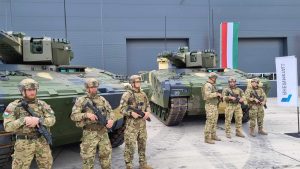
Photo: Hungary Today
Have you had to implement changes during the manufacturing process in situ as compared to the original design ordered in 2020?
Improvements and changes will continuously be made throughout the lifecycle of any armored vehicle which can last many decades. This is also true for the Lynx. The Lynx as a platform is uniquely versatile meaning it can take on many different roles and fulfill different tasks on the battlefield with only minor changes to the platform itself. Some of these Lynx variants like the armored ambulance, mortar carrier or Skyranger 30 air defense are currently being developed. Some of these variants will certainly require our production process to be slightly changed.
Purely from the technical point of view, did you receive any request for modification from the Hungarian armed forces in view of the lessons learned from the Ukrainian battlefield?
If we did, I could not tell you.
There must be those at Rheinmetall, whose job is to make predictions for the battlefield of the future. Are heavy, expensive, complex systems such as the Lynx still in the picture?
They are and will continue to be. Surely military systems will evolve as they have in the past and Rheinmetall is at the forefront of improving land system capabilities. Do we see changes to designs and capabilities: sure but taking and holding ground will remain a key military task for which mobile, protected and armed ground forces are necessary.
Are there any updates concerning the new KF51 MBT project that Hungary had expressed an interest at participating in? Will Zalaegerszeg see another production line apart from that manufacturing the Lynx?
Let us wait and see. For Rheinmetall Hungary I can say that we would very much welcome such a decision. Building the most advanced main battle tank in the most modern armored vehicle production site would be exciting.
How are future orders of the Lynx shaping up? Is there a possibility of producing for exports, rather than just for the Hungarian market?
We see that the interest in Lynx around Europe and indeed the world is high and growing. The partnership between Rheinmetall and Leonardo which also includes Lynx technology for the Italian army is one of the recent examples.
Offering the capabilities and capacity of our Zalaegerszeg facility into future Lynx programs outside of Hungary has been and still is our clear intention. But it is too early to comment on the possible extent and scope which will also vary depending on the localization that is technically, politically and economically required and feasible in each case.
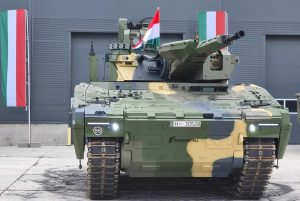
Lynx KF 41, Photo: Hungary Today
At the beginning of the month Rheinmetall had signed a memorandum establishing a joint venture aimed at the commercialization of the new main battle tank and the new Lynx platform for the Armored Infantry Combat System (AICS), within the Italian Army. Should this come to fruition, could the Hungarian facilities benefit from such an undertaking?
It is too early to estimate the possible extent and scope of our participation in this case. But in any case further market successes of the Lynx KF41 would be good news for the Hungarian Defense Forces. It strengthens military cooperation and increases the Lynx user base which leads to a more diverse supply chain and cost reductions during the lifecycle of the fleet.
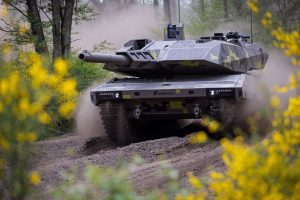
KF51 Panther. Photo: Honvedelem.hu

The team in Zalaegerszeg have proudly unveiled their first domestic-made vehicles. Continue reading
Featured Image: Hungary Today
Array
(
[1536x1536] => Array
(
[width] => 1536
[height] => 1536
[crop] =>
)
[2048x2048] => Array
(
[width] => 2048
[height] => 2048
[crop] =>
)
)